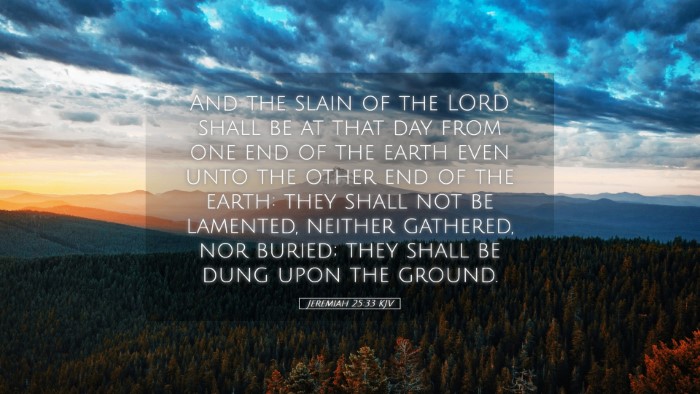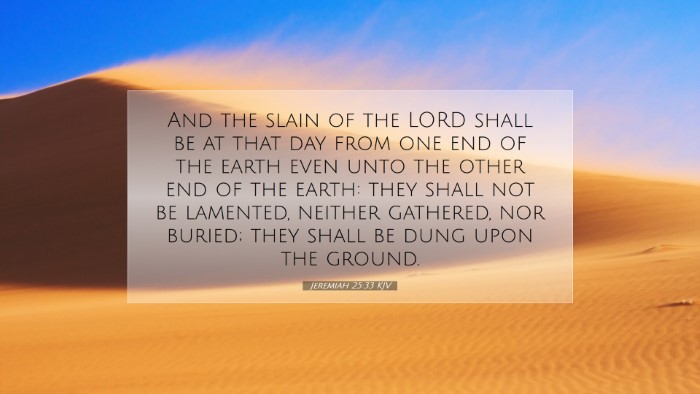Commentary on Jeremiah 25:33
Verse Reference: Jeremiah 25:33 - "And the slain of the Lord shall be at that day from one end of the earth even unto the other end of the earth: they shall not be lamented, neither gathered, nor buried; they shall be dung upon the ground."
Introduction
This verse from the prophet Jeremiah serves as a grim reminder of the consequences of disobedience to God. The imagery invoked speaks of widespread devastation and divine judgment, marking a pivotal moment in the historical narrative regarding God's people. The insights drawn from classic public domain commentaries such as those by Matthew Henry, Albert Barnes, and Adam Clarke provide a deeper understanding of the themes presented in this passage.
Contextual Background
Before delving into the specifics of the verse, it is essential to consider the broader context. Jeremiah prophesied during the late 7th and early 6th centuries B.C., a period characterized by the impending Babylonian captivity of Judah. His message was largely one of warning and judgment against Israel's persistent idolatry and moral failures. This particular verse emphasizes the severity of God’s judgment and serves as an epitome of the prophetic tradition aimed at directing the people back to covenant faithfulness.
Exegesis of the Text
Jeremiah 25:33 captures a harrowing image of destruction. Each phrase merits careful examination:
- "The slain of the Lord": This phrase signifies those who have suffered as a result of God’s judgment. They are described as slain not only by human hands but as a result of divine ordinance.
- "Shall be at that day": The reference to "that day" indicates a specific time of judgment, likely the conclusion of a prophetic timeline culminating in catastrophe for the nation of Judah.
- "From one end of the earth even unto the other end of the earth": This expression highlights the totality of the devastation. The scope of God’s judgment is universal, leaving no corner untouched by His wrath.
- "They shall not be lamented, neither gathered, nor buried": The absence of lamentation underscores a societal breakdown, where the dead are not afforded the dignity of a proper burial. Instead, they become "dung upon the ground," a graphic depiction that signals utter shame and disregard.
Theological Insights
This verse raises critical theological considerations which can inform the understanding of God's judgment, the nature of sin, and the eschatological implications.
- Divine Judgment: Matthew Henry elucidates that God's judgments are often executed in various forms, and here they serve as a sobering reminder that spiritual apathy leads to severe consequences.
- The Reality of Sin: According to Albert Barnes, the indifference to sin leads to dire results. This verse serves as a stark warning, illustrating the urgency for nations and individuals alike to turn from evil.
- Eschatological Implications: Adam Clarke suggests that this prophecy can also be viewed through an eschatological lens, wherein the ultimate judgment of humanity is affirmed. The universal plea for righteousness remains a timeless message.
Historical Context and Application
In the historical context, the fall of Jerusalem resulted from Israel's unrepentant heart despite numerous warnings. This scenario prompts reflection on contemporary narratives where nations often embrace moral degeneration.
And thus, for modern-day pastors and theologians, the application of this text focuses on the importance of repentance and the dire need to heed prophetic warnings. The passage can be utilized to encourage congregations to avoid complacency in spiritual matters.
Pastoral Reflections
For pastors, this verse serves as a pivotal call to deliver robust teachings on judgment and grace. The stark reality of consequences due to disobedience invites discussions around God’s faithfulness versus His justice.
Moreover, preaching from Jeremiah 25:33 can open avenues for deep discussions on the weight of sin, the nature of divine retribution, and the hope found in repentance and restoration.
Conclusion
Jeremiah 25:33 is a profound and challenging verse that encapsulates the severity of God's judgment against unfaithfulness. Insights drawn from public domain commentaries amplify the verse’s significance, spotlighting key theological principles and historical applications. As we grapple with its meanings, we are reminded of God's call to righteousness and the dire consequences of neglecting His ways.


